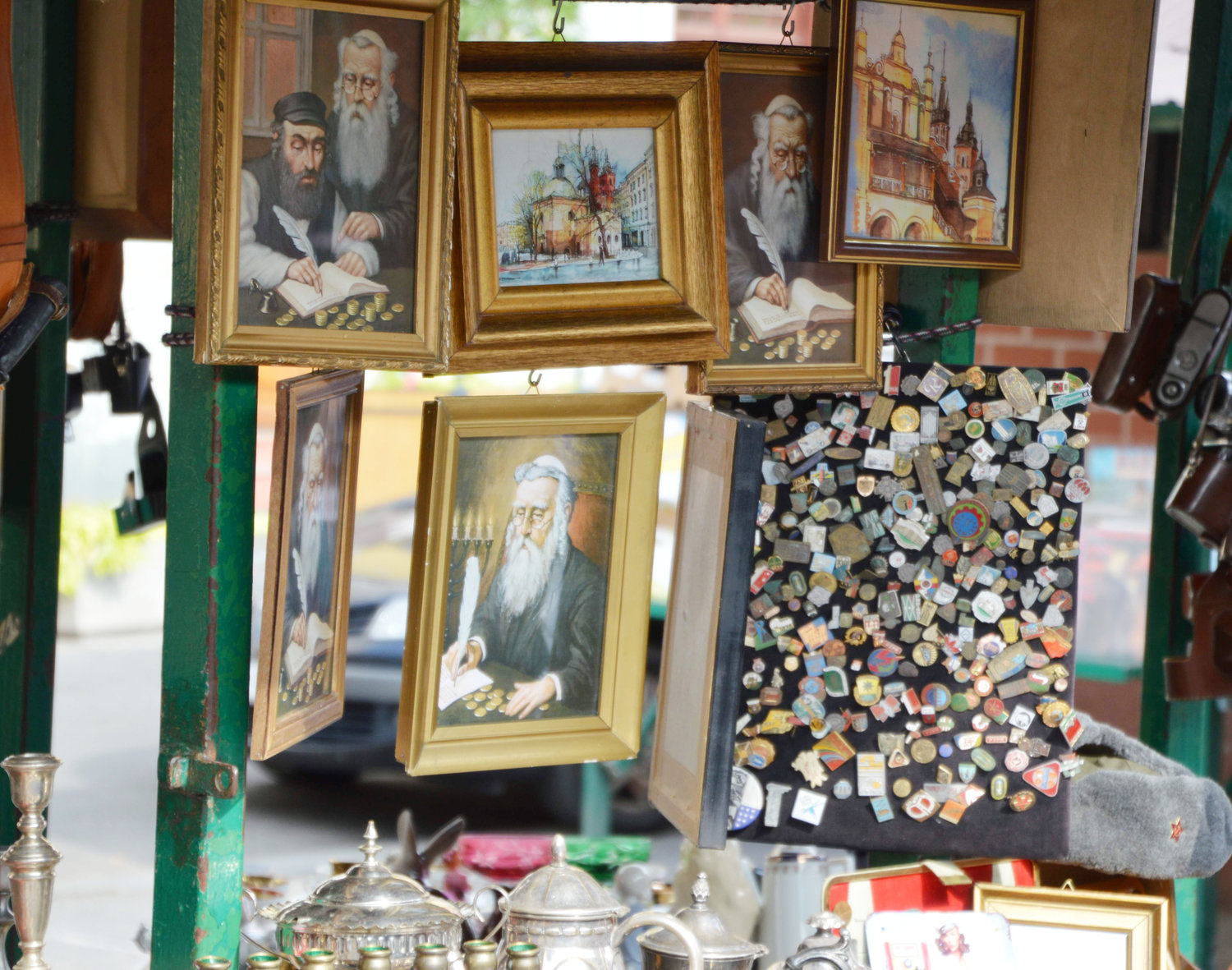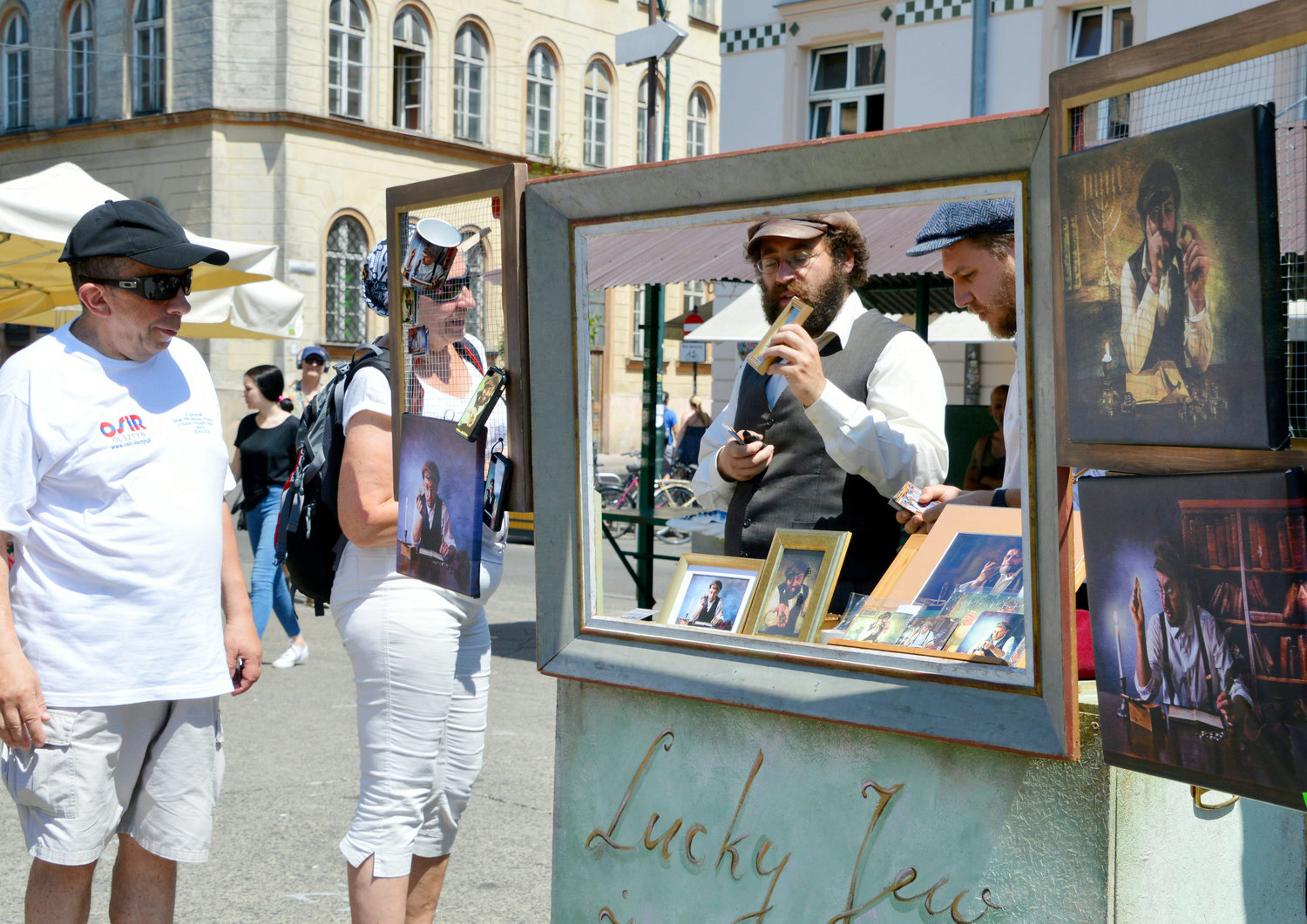The ‘Lucky Jew’ of Poland
Among the memorabilia sold in Kazimierz’s Plac Nowy, or New Square – as well as in other parts of Krakow and throughout Poland – are pictures and figurines of the “Lucky Jew.”
There are quite a few artistic variations on this theme. A common Lucky Jew portrait depicts a bearded man dressed in pre-World War II Eastern European Jewish garb counting gold coins. Another shows a bearded Jew writing numbers in a ledger with a quill pen.
Such items are thought to bring good luck, especially financial luck, and are hung in homes and shops throughout Poland.
In the U.S., these images would immediately be identified as expressions of anti-Jewish prejudice. In Poland, it is perhaps more complicated.
Since 2017, another Jewish festival has taken place in Krakow alongside the more established Jewish Culture Festival. Called FestivALT, it was founded in 2016 by Jason Francisco, Michael Rubenfeld, Magda Rubenfeld Koralewska and Maia Ipp.
“Essentially, FestivALT was created to bring contemporary art about Jewish history, memory and identity in Poland to Krakow,” Francisco, who has lived there on and off since 2010, told me when I asked why a second Jewish festival was needed in the same place at the same time.
When Rubenfeld, a Canadian actor now living in Krakow, first saw the Lucky Jew images, he was surprised. One of his responses was to create a performance piece in which he, Francisco and the author Menachem Kaiser grew beards, dressed in garb resembling that of one of the commonly portrayed Lucky Jew characters, and set up a booth in Plac Nowy. There, seated amid a pile of coins, a ledger and a quill pen, they interacted with passersby.
I ran into Rubenfeld in a pub in Plac Nowy late one night. He was wearing his Lucky Jew attire, and I recognized him from an article I had read a year or two ago. I joined him at his table and he informed me that there would be a Lucky Jew performance in the square this year too, followed by a panel discussion at the Galicia Jewish Museum titled “Real, Live, Lucky Jews.”
One of the people I met at a Shabbat dinner in Krakow was a non-Jewish woman, Agnieszka Skladzien, 31, who had left Poland to work as a nurse in Switzerland. Before moving to Switzerland, she had been a volunteer at Krakow’s Jewish Community Center. Skladzien had returned to Krakow for the Jewish Culture Festival. I asked her to go with me to the Lucky Jew performance.
We arrived at Plac Nowy to find that Rubenfeld and a writer, Adam Schorin, were set up in the same Lucky Jew booth as two years ago, but now – having had their portraits painted in the style of the coin-tallying Lucky Jew – they were selling Lucky Jew portraits of themselves. A number of curious and amused Polish passersby stopped and had friendly conversations with Rubenfeld and Schorin. A riveted British tourist bought several of their portraits.
I asked my new friend what she thought of all this. Skladzien replied that Jews had natural financial intelligence and Polish people wanted some of this luck. For her, it was not a negative stereotype. In fact, she said, she had purchased a Lucky Jew portrait for her mother and owned one herself.
As I said, in Poland, it is perhaps more complicated.
As part of the panel discussion at the Galicia Jewish Museum that afternoon, there was a screening of a short documentary film in which Rubenfeld heads to a Krakow fair on Easter to sell portraits of himself as a Lucky Jew. This was followed by clips of various intellectuals’ reactions to the Lucky Jew performance piece.
In the video clip of his response to the piece, Rabbi Michael Schudrich, the American-born chief rabbi of Poland, stressed that provocation is not necessarily education. He considers the widespread Lucky Jew phenomenon to be upside down and wrong: both anti-Semitic and anti-Polish. (Editor’s note: Schudrich is the brother of Cantor Nathaniel Schudrich of New Bedford’s Tifereth Israel Congregation.)
After the event ended, I turned to a woman who sat next to me, Margaret Krawecka, and asked for her thoughts. This ended up being one of the most emotional conversations I had in Krakow.
“Polish people have intergenerational trauma from witnessing the abuse and destruction of their friends and neighbors,” said Krawecka, a Polish-born artist and architectural and interior design consultant who lives in Canada. “Non-Jews are trying to come to terms with the fact that about one-fifth of the population [in Poland] was wiped out [during World War II]. Some Polish people helped Jews at risk to their lives, some collaborated, but most just watched, paralyzed by the fear and terror spread by the Nazi occupiers. There is a feeling of helplessness – and maybe also a confused sense of guilt.
“This country is still very deeply affected by the trauma of World War II. Even me. I was born in 1978, many years after the war, and still the weight is heavy. It is the memory.
“Some Polish people seem like they are not ready to move on. Of course, they have to. You can never forget what happened, but you also have to move forward – without forgetting. A lot of people have an existential void, a sense of nostalgia, a missing of another time and place.
“In some strange way, perhaps these figurines of Jews, these lucky charms, are an attempt to bring back the past. There are so many complexities, so many layers. It is almost like the word ‘Jew’ has become a symbol.”











